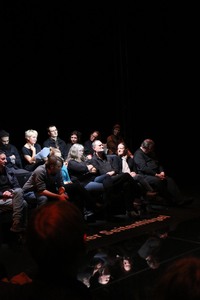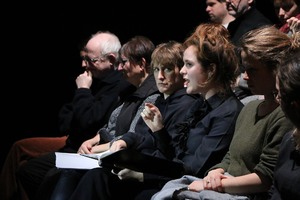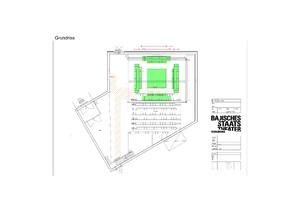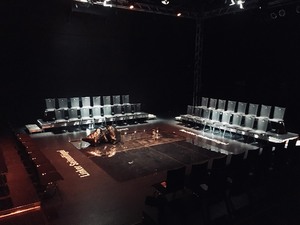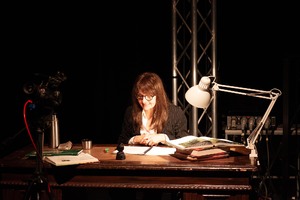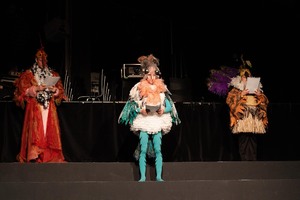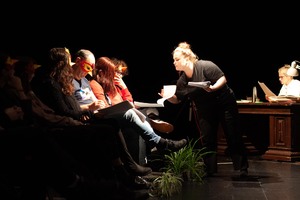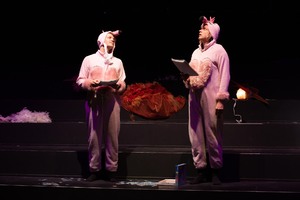Tobias Dömer
| Name | Tobias Dömer |
21 Inhalte
- Seite 1 von 2
DNS #63
- Titel
- DNS #63
- Untertitel
- Zu unseren Füßen, das Gold, aus dem Boden Verschwunden
- Autor/in
- Beschreibung (de)
-
Ein Wohnhaus in Berlin: darin ein alter Trinker, ein lesbisches Paar, ein Geflüchteter, eine depressive Frau und ihr Ex-Mann. Im Stück „Zu unseren Füßen, das Gold, aus dem Boden verschwunden“ von Svealena Kutschke entspinnen sich im Alltag jener Figuren Fragen nach unserem Umgang mit dem Fremdem – sei es kultureller oder ideologischer Couleur. Die voyeuristische Situation, in welcher sich jegliche Erkenntnis nur durch die Blicke und Zuschreibungen der Nachbarn vollzieht, wurde hierfür in eine panoptische Szenografie übersetzt. Darin bewohnen die Schauspieler gemeinsam mit den Zuschauern Vorder- und Hinterhaus sowie die Seitenflügel, um so gleichsam eine diskursive wie affizierende Arena aufzuspannen. In der Mitte, ein Spiegel. Jene Leerstelle fungiert zugleich – in Form des Hinterhofs – als Austragungsort der einsamen Monologe wie auch als räumlicher Akteur für den, in der Besetzung nicht vorgesehenen, Flüchtling. Ob und wie jene Figur durch die Spiegelreflexion eine Stimme erlangt oder ob die Anwesenden in der Betrachtung lediglich auf sich selbst zurückgeworfen werden, bleibt bewusst eine offene, ungelöste Frage.
-
- Beschreibung (en)
-
An apartment building in Berlin: an old drunk, a lesbian couple, a refugee, a depressed woman and her ex-husband. In Svealena Kutschke's play "Zu unseren Füßen, das Gold, aus dem Boden verschwunden" (At our feet, the gold that has disappeared from the ground), questions about how we deal with the foreign - be it of a cultural or ideological nature - arise in the everyday lives of these characters. The voyeuristic situation, in which all knowledge is only gained through the gazes and attributions of the neighbors, was translated into a panoptic scenography. In it, the actors inhabit the front and back houses as well as the side wings together with the audience in order to create an arena that is both discursive and affirmative. In the middle, a mirror. This empty space functions simultaneously - in the form of the backyard - as a venue for the solitary monologues and as a spatial actor for the refugee, who is not included in the cast. Whether and how this figure acquires a voice through the mirror reflection or whether those present are merely thrown back on themselves in the reflection deliberately remains an open, unresolved question.
-
- Typ des Projekts/Werks
- Schlagworte
- Datierung
- 13.12.2019
- Mitwirkende
- Sprache
- Ort: Institution
- Ort
- Studio
- Stadt
- Land
- Beteiligte Institution(en)
- Bemerkungen
- Szenische Lesung
Bühne: Julia Ihls und Gloria Müller, ADSZ Hfg Karslruhe WS 2019/2020
Regie: Tobias Dömer
Dramaturgie: Nele Lindemann, Anna Haas
Mit: Ute Baggeröhr, Marie-Joelle Blazejewski, Antonia Mohr, Sven Daniel Bühler, Timo Tank
- Szenische Lesung
- Titel
- DNS #63
- Urheberrechtshinweis
- Julia Ihls und Paulina Mimberg
- Rechtsschutz/Lizenz
- Medienersteller/in
- Beziehung/Funktion
- Projektleiter/in
- Semester
- Studiengang
- Lehrveranstaltung
- Importiert am
- 19.12.2023
- Übergeordnete Sets
- 1
DNS #63
- Titel
- DNS #63
- Untertitel
- Zu unseren Füßen, das Gold, aus dem Boden Verschwunden
- Autor/in
- Beschreibung (de)
-
Ein Wohnhaus in Berlin: darin ein alter Trinker, ein lesbisches Paar, ein Geflüchteter, eine depressive Frau und ihr Ex-Mann. Im Stück „Zu unseren Füßen, das Gold, aus dem Boden verschwunden“ von Svealena Kutschke entspinnen sich im Alltag jener Figuren Fragen nach unserem Umgang mit dem Fremdem – sei es kultureller oder ideologischer Couleur. Die voyeuristische Situation, in welcher sich jegliche Erkenntnis nur durch die Blicke und Zuschreibungen der Nachbarn vollzieht, wurde hierfür in eine panoptische Szenografie übersetzt. Darin bewohnen die Schauspieler gemeinsam mit den Zuschauern Vorder- und Hinterhaus sowie die Seitenflügel, um so gleichsam eine diskursive wie affizierende Arena aufzuspannen. In der Mitte, ein Spiegel. Jene Leerstelle fungiert zugleich – in Form des Hinterhofs – als Austragungsort der einsamen Monologe wie auch als räumlicher Akteur für den, in der Besetzung nicht vorgesehenen, Flüchtling. Ob und wie jene Figur durch die Spiegelreflexion eine Stimme erlangt oder ob die Anwesenden in der Betrachtung lediglich auf sich selbst zurückgeworfen werden, bleibt bewusst eine offene, ungelöste Frage.
-
- Beschreibung (en)
-
An apartment building in Berlin: an old drunk, a lesbian couple, a refugee, a depressed woman and her ex-husband. In Svealena Kutschke's play "Zu unseren Füßen, das Gold, aus dem Boden verschwunden" (At our feet, the gold that has disappeared from the ground), questions about how we deal with the foreign - be it of a cultural or ideological nature - arise in the everyday lives of these characters. The voyeuristic situation, in which all knowledge is only gained through the gazes and attributions of the neighbors, was translated into a panoptic scenography. In it, the actors inhabit the front and back houses as well as the side wings together with the audience in order to create an arena that is both discursive and affirmative. In the middle, a mirror. This empty space functions simultaneously - in the form of the backyard - as a venue for the solitary monologues and as a spatial actor for the refugee, who is not included in the cast. Whether and how this figure acquires a voice through the mirror reflection or whether those present are merely thrown back on themselves in the reflection deliberately remains an open, unresolved question.
-
- Typ des Projekts/Werks
- Schlagworte
- Datierung
- 13.12.2019
- Mitwirkende
- Sprache
- Ort: Institution
- Ort
- Studio
- Stadt
- Land
- Beteiligte Institution(en)
- Bemerkungen
- Szenische Lesung
Bühne: Julia Ihls und Gloria Müller, ADSZ Hfg Karslruhe WS 2019/2020
Regie: Tobias Dömer
Dramaturgie: Nele Lindemann, Anna Haas
Mit: Ute Baggeröhr, Marie-Joelle Blazejewski, Antonia Mohr, Sven Daniel Bühler, Timo Tank
- Szenische Lesung
- Titel
- DNS #63
- Urheberrechtshinweis
- Julia Ihls und Paulina Mimberg
- Rechtsschutz/Lizenz
- Medienersteller/in
- Beziehung/Funktion
- Projektleiter/in
- Semester
- Studiengang
- Lehrveranstaltung
- Importiert am
- 19.12.2023
- Übergeordnete Sets
- 1
DNS #63
- Titel
- DNS #63
- Untertitel
- Zu unseren Füßen, das Gold, aus dem Boden Verschwunden
- Autor/in
- Beschreibung (de)
-
Ein Wohnhaus in Berlin: darin ein alter Trinker, ein lesbisches Paar, ein Geflüchteter, eine depressive Frau und ihr Ex-Mann. Im Stück „Zu unseren Füßen, das Gold, aus dem Boden verschwunden“ von Svealena Kutschke entspinnen sich im Alltag jener Figuren Fragen nach unserem Umgang mit dem Fremdem – sei es kultureller oder ideologischer Couleur. Die voyeuristische Situation, in welcher sich jegliche Erkenntnis nur durch die Blicke und Zuschreibungen der Nachbarn vollzieht, wurde hierfür in eine panoptische Szenografie übersetzt. Darin bewohnen die Schauspieler gemeinsam mit den Zuschauern Vorder- und Hinterhaus sowie die Seitenflügel, um so gleichsam eine diskursive wie affizierende Arena aufzuspannen. In der Mitte, ein Spiegel. Jene Leerstelle fungiert zugleich – in Form des Hinterhofs – als Austragungsort der einsamen Monologe wie auch als räumlicher Akteur für den, in der Besetzung nicht vorgesehenen, Flüchtling. Ob und wie jene Figur durch die Spiegelreflexion eine Stimme erlangt oder ob die Anwesenden in der Betrachtung lediglich auf sich selbst zurückgeworfen werden, bleibt bewusst eine offene, ungelöste Frage.
-
- Beschreibung (en)
-
An apartment building in Berlin: an old drunk, a lesbian couple, a refugee, a depressed woman and her ex-husband. In Svealena Kutschke's play "Zu unseren Füßen, das Gold, aus dem Boden verschwunden" (At our feet, the gold that has disappeared from the ground), questions about how we deal with the foreign - be it of a cultural or ideological nature - arise in the everyday lives of these characters. The voyeuristic situation, in which all knowledge is only gained through the gazes and attributions of the neighbors, was translated into a panoptic scenography. In it, the actors inhabit the front and back houses as well as the side wings together with the audience in order to create an arena that is both discursive and affirmative. In the middle, a mirror. This empty space functions simultaneously - in the form of the backyard - as a venue for the solitary monologues and as a spatial actor for the refugee, who is not included in the cast. Whether and how this figure acquires a voice through the mirror reflection or whether those present are merely thrown back on themselves in the reflection deliberately remains an open, unresolved question.
-
- Typ des Projekts/Werks
- Schlagworte
- Datierung
- 13.12.2019
- Mitwirkende
- Sprache
- Ort: Institution
- Ort
- Studio
- Stadt
- Land
- Beteiligte Institution(en)
- Bemerkungen
- Szenische Lesung
Bühne: Julia Ihls und Gloria Müller, ADSZ Hfg Karslruhe WS 2019/2020
Regie: Tobias Dömer
Dramaturgie: Nele Lindemann, Anna Haas
Mit: Ute Baggeröhr, Marie-Joelle Blazejewski, Antonia Mohr, Sven Daniel Bühler, Timo Tank
- Szenische Lesung
- Titel
- DNS #63
- Urheberrechtshinweis
- Julia Ihls und Paulina Mimberg
- Rechtsschutz/Lizenz
- Medienersteller/in
- Beziehung/Funktion
- Projektleiter/in
- Semester
- Studiengang
- Lehrveranstaltung
- Importiert am
- 19.12.2023
- Übergeordnete Sets
- 1
DNS #63
- Titel
- DNS #63
- Untertitel
- Zu unseren Füßen, das Gold, aus dem Boden Verschwunden
- Autor/in
- Beschreibung (de)
-
Ein Wohnhaus in Berlin: darin ein alter Trinker, ein lesbisches Paar, ein Geflüchteter, eine depressive Frau und ihr Ex-Mann. Im Stück „Zu unseren Füßen, das Gold, aus dem Boden verschwunden“ von Svealena Kutschke entspinnen sich im Alltag jener Figuren Fragen nach unserem Umgang mit dem Fremdem – sei es kultureller oder ideologischer Couleur. Die voyeuristische Situation, in welcher sich jegliche Erkenntnis nur durch die Blicke und Zuschreibungen der Nachbarn vollzieht, wurde hierfür in eine panoptische Szenografie übersetzt. Darin bewohnen die Schauspieler gemeinsam mit den Zuschauern Vorder- und Hinterhaus sowie die Seitenflügel, um so gleichsam eine diskursive wie affizierende Arena aufzuspannen. In der Mitte, ein Spiegel. Jene Leerstelle fungiert zugleich – in Form des Hinterhofs – als Austragungsort der einsamen Monologe wie auch als räumlicher Akteur für den, in der Besetzung nicht vorgesehenen, Flüchtling. Ob und wie jene Figur durch die Spiegelreflexion eine Stimme erlangt oder ob die Anwesenden in der Betrachtung lediglich auf sich selbst zurückgeworfen werden, bleibt bewusst eine offene, ungelöste Frage.
-
- Beschreibung (en)
-
An apartment building in Berlin: an old drunk, a lesbian couple, a refugee, a depressed woman and her ex-husband. In Svealena Kutschke's play "Zu unseren Füßen, das Gold, aus dem Boden verschwunden" (At our feet, the gold that has disappeared from the ground), questions about how we deal with the foreign - be it of a cultural or ideological nature - arise in the everyday lives of these characters. The voyeuristic situation, in which all knowledge is only gained through the gazes and attributions of the neighbors, was translated into a panoptic scenography. In it, the actors inhabit the front and back houses as well as the side wings together with the audience in order to create an arena that is both discursive and affirmative. In the middle, a mirror. This empty space functions simultaneously - in the form of the backyard - as a venue for the solitary monologues and as a spatial actor for the refugee, who is not included in the cast. Whether and how this figure acquires a voice through the mirror reflection or whether those present are merely thrown back on themselves in the reflection deliberately remains an open, unresolved question.
-
- Typ des Projekts/Werks
- Schlagworte
- Datierung
- 13.12.2019
- Mitwirkende
- Sprache
- Ort: Institution
- Ort
- Studio
- Stadt
- Land
- Beteiligte Institution(en)
- Bemerkungen
- Szenische Lesung
Bühne: Julia Ihls und Gloria Müller, ADSZ Hfg Karslruhe WS 2019/2020
Regie: Tobias Dömer
Dramaturgie: Nele Lindemann, Anna Haas
Mit: Ute Baggeröhr, Marie-Joelle Blazejewski, Antonia Mohr, Sven Daniel Bühler, Timo Tank
- Szenische Lesung
- Titel
- DNS #63
- Urheberrechtshinweis
- Alle Rechte vorbehalten.
- Rechtsschutz/Lizenz
- Medienersteller/in
- Beziehung/Funktion
- Projektleiter/in
- Semester
- Studiengang
- Lehrveranstaltung
- Importiert am
- 19.12.2023
- Übergeordnete Sets
- 1
DNS #63
- Titel
- DNS #63
- Untertitel
- Zu unseren Füßen, das Gold, aus dem Boden Verschwunden
- Autor/in
- Beschreibung (de)
-
Ein Wohnhaus in Berlin: darin ein alter Trinker, ein lesbisches Paar, ein Geflüchteter, eine depressive Frau und ihr Ex-Mann. Im Stück „Zu unseren Füßen, das Gold, aus dem Boden verschwunden“ von Svealena Kutschke entspinnen sich im Alltag jener Figuren Fragen nach unserem Umgang mit dem Fremdem – sei es kultureller oder ideologischer Couleur. Die voyeuristische Situation, in welcher sich jegliche Erkenntnis nur durch die Blicke und Zuschreibungen der Nachbarn vollzieht, wurde hierfür in eine panoptische Szenografie übersetzt. Darin bewohnen die Schauspieler gemeinsam mit den Zuschauern Vorder- und Hinterhaus sowie die Seitenflügel, um so gleichsam eine diskursive wie affizierende Arena aufzuspannen. In der Mitte, ein Spiegel. Jene Leerstelle fungiert zugleich – in Form des Hinterhofs – als Austragungsort der einsamen Monologe wie auch als räumlicher Akteur für den, in der Besetzung nicht vorgesehenen, Flüchtling. Ob und wie jene Figur durch die Spiegelreflexion eine Stimme erlangt oder ob die Anwesenden in der Betrachtung lediglich auf sich selbst zurückgeworfen werden, bleibt bewusst eine offene, ungelöste Frage.
-
- Beschreibung (en)
-
An apartment building in Berlin: an old drunk, a lesbian couple, a refugee, a depressed woman and her ex-husband. In Svealena Kutschke's play "Zu unseren Füßen, das Gold, aus dem Boden verschwunden" (At our feet, the gold that has disappeared from the ground), questions about how we deal with the foreign - be it of a cultural or ideological nature - arise in the everyday lives of these characters. The voyeuristic situation, in which all knowledge is only gained through the gazes and attributions of the neighbors, was translated into a panoptic scenography. In it, the actors inhabit the front and back houses as well as the side wings together with the audience in order to create an arena that is both discursive and affirmative. In the middle, a mirror. This empty space functions simultaneously - in the form of the backyard - as a venue for the solitary monologues and as a spatial actor for the refugee, who is not included in the cast. Whether and how this figure acquires a voice through the mirror reflection or whether those present are merely thrown back on themselves in the reflection deliberately remains an open, unresolved question.
-
- Typ des Projekts/Werks
- Schlagworte
- Datierung
- 13.12.2019
- Mitwirkende
- Sprache
- Ort: Institution
- Ort
- Studio
- Stadt
- Land
- Beteiligte Institution(en)
- Bemerkungen
- Szenische Lesung
Bühne: Julia Ihls und Gloria Müller, ADSZ Hfg Karslruhe WS 2019/2020
Regie: Tobias Dömer
Dramaturgie: Nele Lindemann, Anna Haas
Mit: Ute Baggeröhr, Marie-Joelle Blazejewski, Antonia Mohr, Sven Daniel Bühler, Timo Tank
- Szenische Lesung
- Titel
- DNS #63
- Urheberrechtshinweis
- Julia Ihls und Paulina Mimberg
- Rechtsschutz/Lizenz
- Medienersteller/in
- Beziehung/Funktion
- Projektleiter/in
- Semester
- Studiengang
- Lehrveranstaltung
- Importiert am
- 19.12.2023
- Übergeordnete Sets
- 1
DNS #65
- Titel
- DNS #65
- Untertitel
- Bookpink
- Autor/in
- Beschreibung (de)
- In sieben komisch-poetischen Miniaturen beschreibt Caren Jeß menschliche Abgründe im Gewand von Federtieren wie dem Dreckspfau, der Sumpfmeise, tanzenden Flamingos oder dem Bussard im Beton der Vernunft. Ein Stück voller Humor, subtilem Wortwitz und draller Situationskomik.
- Beschreibung (en)
- In seven comic-poetic miniatures, Caren Jeß describes human abysses in the guise of feathered creatures such as the peacock, the marsh tit, dancing flamingos or the buzzard in the concrete of reason. A play full of humor, subtle wordplay and gritty situation comedy.
- Typ des Projekts/Werks
- Schlagworte
- Datierung
- 27.02.2020
- Mitwirkende
- Sprache
- Dauer
- 1 Stunde 30 Minuten
- Ort: Institution
- Ort
- Studio
- Stadt
- Land
- Beteiligte Institution(en)
- Bemerkungen
- Szenische Lesung und Autor*innengespräch
Bühne/Kostüm: Paula Klotzki, Jana Trampert, Cara Kollmann, Julia Ihls
Dramaturgie: Nele Lindemann, Anna Haas
Regie: Tobias Döhmer
SchauspielerInnen: Antonia Mohr, Jannek Petri, Alisa Kunina, Pål Fredrik Kvale, Constantin Petry
Plakat: Julia Ihls
- Szenische Lesung und Autor*innengespräch
- Titel
- DNS #65
- Urheberrechtshinweis
- Cara Kollmann
- Rechtsschutz/Lizenz
- Medienersteller/in
- Beziehung/Funktion
- Projektleiter/in
- Semester
- Studiengang
- Lehrveranstaltung
- Importiert am
- 19.12.2023
- Übergeordnete Sets
- 1
DNS #65
- Titel
- DNS #65
- Untertitel
- Bookpink
- Autor/in
- Beschreibung (de)
- In sieben komisch-poetischen Miniaturen beschreibt Caren Jeß menschliche Abgründe im Gewand von Federtieren wie dem Dreckspfau, der Sumpfmeise, tanzenden Flamingos oder dem Bussard im Beton der Vernunft. Ein Stück voller Humor, subtilem Wortwitz und draller Situationskomik.
- Beschreibung (en)
- In seven comic-poetic miniatures, Caren Jeß describes human abysses in the guise of feathered creatures such as the peacock, the marsh tit, dancing flamingos or the buzzard in the concrete of reason. A play full of humor, subtle wordplay and gritty situation comedy.
- Typ des Projekts/Werks
- Schlagworte
- Datierung
- 27.02.2020
- Mitwirkende
- Sprache
- Dauer
- 1 Stunde 30 Minuten
- Ort: Institution
- Ort
- Studio
- Stadt
- Land
- Beteiligte Institution(en)
- Bemerkungen
- Szenische Lesung und Autor*innengespräch
Bühne/Kostüm: Paula Klotzki, Jana Trampert, Cara Kollmann, Julia Ihls
Dramaturgie: Nele Lindemann, Anna Haas
Regie: Tobias Döhmer
SchauspielerInnen: Antonia Mohr, Jannek Petri, Alisa Kunina, Pål Fredrik Kvale, Constantin Petry
Plakat: Julia Ihls
- Szenische Lesung und Autor*innengespräch
- Titel
- DNS #65
- Urheberrechtshinweis
- Cara Kollmann
- Rechtsschutz/Lizenz
- Medienersteller/in
- Beziehung/Funktion
- Projektleiter/in
- Semester
- Studiengang
- Lehrveranstaltung
- Importiert am
- 19.12.2023
- Übergeordnete Sets
- 1
DNS #65
- Titel
- DNS #65
- Untertitel
- Bookpink
- Autor/in
- Beschreibung (de)
- In sieben komisch-poetischen Miniaturen beschreibt Caren Jeß menschliche Abgründe im Gewand von Federtieren wie dem Dreckspfau, der Sumpfmeise, tanzenden Flamingos oder dem Bussard im Beton der Vernunft. Ein Stück voller Humor, subtilem Wortwitz und draller Situationskomik.
- Beschreibung (en)
- In seven comic-poetic miniatures, Caren Jeß describes human abysses in the guise of feathered creatures such as the peacock, the marsh tit, dancing flamingos or the buzzard in the concrete of reason. A play full of humor, subtle wordplay and gritty situation comedy.
- Typ des Projekts/Werks
- Schlagworte
- Datierung
- 27.02.2020
- Mitwirkende
- Sprache
- Dauer
- 1 Stunde 30 Minuten
- Ort: Institution
- Ort
- Studio
- Stadt
- Land
- Beteiligte Institution(en)
- Bemerkungen
- Szenische Lesung und Autor*innengespräch
Bühne/Kostüm: Paula Klotzki, Jana Trampert, Cara Kollmann, Julia Ihls
Dramaturgie: Nele Lindemann, Anna Haas
Regie: Tobias Döhmer
SchauspielerInnen: Antonia Mohr, Jannek Petri, Alisa Kunina, Pål Fredrik Kvale, Constantin Petry
Plakat: Julia Ihls
- Szenische Lesung und Autor*innengespräch
- Titel
- DNS #65
- Urheberrechtshinweis
- Cara Kollmann
- Rechtsschutz/Lizenz
- Medienersteller/in
- Beziehung/Funktion
- Projektleiter/in
- Semester
- Studiengang
- Lehrveranstaltung
- Importiert am
- 19.12.2023
- Übergeordnete Sets
- 1
DNS #65
- Titel
- DNS #65
- Untertitel
- Bookpink
- Autor/in
- Beschreibung (de)
- In sieben komisch-poetischen Miniaturen beschreibt Caren Jeß menschliche Abgründe im Gewand von Federtieren wie dem Dreckspfau, der Sumpfmeise, tanzenden Flamingos oder dem Bussard im Beton der Vernunft. Ein Stück voller Humor, subtilem Wortwitz und draller Situationskomik.
- Beschreibung (en)
- In seven comic-poetic miniatures, Caren Jeß describes human abysses in the guise of feathered creatures such as the peacock, the marsh tit, dancing flamingos or the buzzard in the concrete of reason. A play full of humor, subtle wordplay and gritty situation comedy.
- Typ des Projekts/Werks
- Schlagworte
- Datierung
- 27.02.2020
- Mitwirkende
- Sprache
- Dauer
- 1 Stunde 30 Minuten
- Ort: Institution
- Ort
- Studio
- Stadt
- Land
- Beteiligte Institution(en)
- Bemerkungen
- Szenische Lesung und Autor*innengespräch
Bühne/Kostüm: Paula Klotzki, Jana Trampert, Cara Kollmann, Julia Ihls
Dramaturgie: Nele Lindemann, Anna Haas
Regie: Tobias Döhmer
SchauspielerInnen: Antonia Mohr, Jannek Petri, Alisa Kunina, Pål Fredrik Kvale, Constantin Petry
Plakat: Julia Ihls
- Szenische Lesung und Autor*innengespräch
- Titel
- DNS #65
- Urheberrechtshinweis
- Cara Kollmann
- Rechtsschutz/Lizenz
- Medienersteller/in
- Beziehung/Funktion
- Projektleiter/in
- Semester
- Studiengang
- Lehrveranstaltung
- Importiert am
- 19.12.2023
- Übergeordnete Sets
- 1
